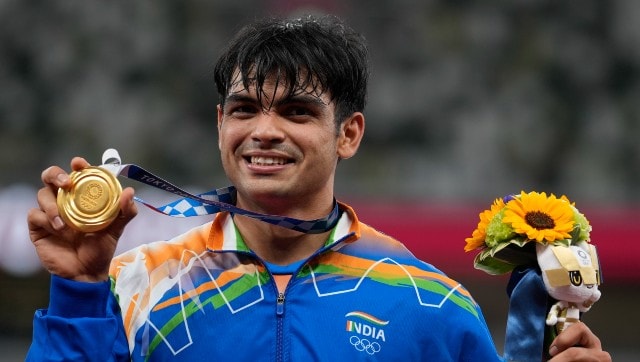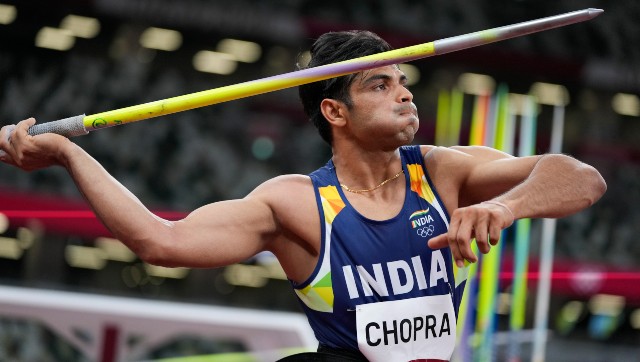It’s surreal, is what it is. A country of over a billion waits 4,743 days — or 157 months, or 13 years — for another individual gold medal at the Olympics! And then, on a clear, but humid, Tokyo evening, in six hurls of a spear weighing 800 grams, a 23-year-old goes where even gods of India’s sporting pantheon have not been: to the top of Mount Olympics. Javelin thrower Neeraj Chopra claimed India’s second individual Olympic gold medal on Saturday. India’s first medal of any colour in track and field since Independence is gold. Saying both of these things out aloud seemed ludicrous even one Olympics ago. Everyone expected a medal from Neeraj. But even for the most gung-ho optimists, Neeraj winning Olympic gold would have seemed improbable. Besides, haven’t the first two weeks of Tokyo 2020 been a rude reminder to Indians of the gulf that exists at an Olympics between expectations and reality.
Vetter’s challenge on Saturday fizzled out after three attempts when he was not among the top 8 who got three additional throws. With Vetter getting eliminated and many top stars like Anderson Peter, Keshorn Walcott, Bernhard Seifert, Marcin Krukowski, and Julius Yego not even making it to the final, Neeraj’s chances improved significantly with three throws remaining. It turned out his second throw of 87.58m was enough to fetch him gold. Once it happened, he walked back to the launching point, bowed and paid his respects to the track. “Yeh javelin aur javelin ka runway track joh hai, aadhi jawaani toh isime chali jaayegi. Yeh track hamaara Bhagwan hai (This sport and the runway are what will consume half of my youth. This runway is my temple),” he said. Neeraj expected himself to break down in tears when the national anthem played in the stadium. But there were no tears when it happened. “When the national anthem played, it felt like a current passing through my body. I thought I would cry, but tears didn’t come,” he said. “All the hardwork, all the injuries, everything that’s happened over the last five years, all the hardships went away when the Indian national anthem started playing. All the hardships were worth it.” On the day he climbed Mount Olympics, Neeraj’s thoughts were with those before him — men and women with storied careers — who could not reach here. [caption id=“attachment_9871821” align=“alignnone” width=“640”]
 Neeraj Chopra poses for pictures with his medal. AP[/caption] Neeraj remembered Milkha Singh, who passed away earlier this year after 61 years of carrying the heartache of missing out at Rome 1960 by 1/10th of a second. And Neeraj thought of PT Usha, who missed the 400-metre hurdles bronze by 1/100th of a second at Los Angeles 1984. Both came within a hair’s breadth of winning a medal at the Olympics. Milkha, the first poster boy for Indian athletics, dreamt of seeing someone from his country do what he could not. So did Usha. “When we were in Kourtane (in Finland), Milkha Singhji passed away and I felt very bad. I wanted to meet him with an Olympic medal around my neck. It is sad that he’s not among us but I hope he’s watching us from above and is happy with this (medal), seeing that his dream has come true. Even athletes like PT Usha and others, who missed out on a medal by centimetres, I hope they’re all happy today,” said Neeraj. Neeraj revealed that Milkha and his paths had crossed once, when they were both on a flight to a sports award function. On that day, Neeraj greeted the Indian legend with folded hands, but Milkha did not recognise him. Later on the flight, Milkha was told by someone that Neeraj was there, after which he called the youngster to his seat and said, “Son, why didn’t you tell me you were Neeraj Chopra?” The shy, soft-spoken youngster wondered how he could walk up to a legend like Milkha and announce himself by name. Today, he doesn’t need to announce anything. Not with that glittering piece of metal hanging on his neck that has been making India’s most revered athletes like Usha and Anju Bobby George gush on social media like fans. Given everything it signifies to a gold medal-starved country like India, does the medal feel heavy? “Even it weighed 10kg, it would feel weightless to me.”
Neeraj Chopra poses for pictures with his medal. AP[/caption] Neeraj remembered Milkha Singh, who passed away earlier this year after 61 years of carrying the heartache of missing out at Rome 1960 by 1/10th of a second. And Neeraj thought of PT Usha, who missed the 400-metre hurdles bronze by 1/100th of a second at Los Angeles 1984. Both came within a hair’s breadth of winning a medal at the Olympics. Milkha, the first poster boy for Indian athletics, dreamt of seeing someone from his country do what he could not. So did Usha. “When we were in Kourtane (in Finland), Milkha Singhji passed away and I felt very bad. I wanted to meet him with an Olympic medal around my neck. It is sad that he’s not among us but I hope he’s watching us from above and is happy with this (medal), seeing that his dream has come true. Even athletes like PT Usha and others, who missed out on a medal by centimetres, I hope they’re all happy today,” said Neeraj. Neeraj revealed that Milkha and his paths had crossed once, when they were both on a flight to a sports award function. On that day, Neeraj greeted the Indian legend with folded hands, but Milkha did not recognise him. Later on the flight, Milkha was told by someone that Neeraj was there, after which he called the youngster to his seat and said, “Son, why didn’t you tell me you were Neeraj Chopra?” The shy, soft-spoken youngster wondered how he could walk up to a legend like Milkha and announce himself by name. Today, he doesn’t need to announce anything. Not with that glittering piece of metal hanging on his neck that has been making India’s most revered athletes like Usha and Anju Bobby George gush on social media like fans. Given everything it signifies to a gold medal-starved country like India, does the medal feel heavy? “Even it weighed 10kg, it would feel weightless to me.”
Amit Kamath is with the sports desk in Mumbai. He covers Olympic sports like wrestling, shooting, and boxing besides also writing about NBA and kabaddi. In 2014, he was declared the runner-up in the sports category at the National RedInk Award for Excellence in Journalism for his story on Sports Authority of India's Kandivli campus where world-class athletes had to put up with appalling conditions. He was a Robert Bosch Media Ambassador in 2019.
)